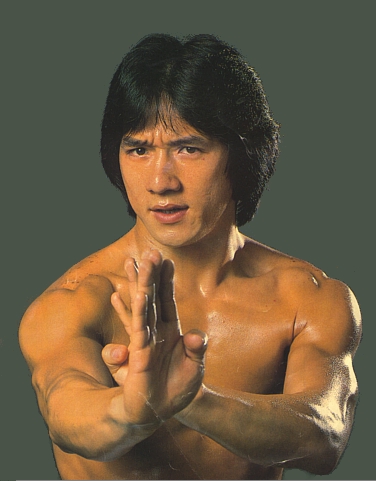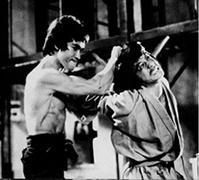History and career
 Promotional picture for New Fist of Fury (1975)
Promotional picture for New Fist of Fury (1975)Jackie Chan was born on April 7th, 1954, under the name Chang Kong Sang, in Victoria Peak, Hong Kong. At an early age, he was enrolled by his parents in the China Drama Academy (or "opera school"), where he received training in martial arts, music, dancing and performances. Training under the watchful eye of master Yu Jim Yuen, Jackie was a dedicated student, and became quick friends with fellow students Sammo Hung and Yuen Biao, who were called the Three Dragons due to their close kinship. In the following years, Chan caught the attention of movie industry watchers, and was offered a small role as a stunt performer in martial arts films.
 Jackie as a stunt performer in Fist of Fury (1972)
Jackie as a stunt performer in Fist of Fury (1972)His first real appearence in camera soon followed, in the 1972 Bruce Lee film Fist of Fury, where we suffers as one of the foes who gets his neck broken by the legendary actor. Slowly, but surely, Jackie took the attention of movie producer Willie Chan, who in 1976 offered him a role in the film Hand of Death. Willie's plan was to turn Jackie into a new Bruce Lee, with films featuring the same type of action that, in hopes, could match the recently deceased's style. The New Fist of Fury debuted in 1976 and was a box office flop. Only in 1978 Jackie would get his chance to mold a film his way, with Snake in the Eagle's Shadow, directed by Yuen Woo Ping, in which Chan performed the many forms of Drunken-style kung-fu. The film was a hit and propelled Chan to stardom, and with the sequel, Drunken Master, his fresh style that mixed serious kung-fu with the comedic stunt scenes and humor brought him to the international movie scene.
1980s
The industry slowly started to change, and by the mid-90s, many reputable Hong Kong directors like John Woo were working in the US and American directors like Quentin Tarantino talked a lot about the influence of Hong Kong style movies. Jackie seamlessly tried to break into Hollywood, but this time acting in his own style. Jackie's eventual first try at a Hollywood breakthrough was in the 1980 film Cannonball Run, which starred big names like Burt Reynolds. Although a small role, the film gave Chan one of his inspirations that is still present in his movies to this day - the inclusion of 'blooper' reels at the closing credits of his own films.
After his mild attempt to maintain a name in Hollywood, Chan decided to head back to Hong Kong, the center of his already established Eastern fame. In 1982's Dragon Lord, intended as a sequel to Young Master, he began experimenting with dangerous stunts. He then produced, in 1983, Project A, in which he starred alongside his old friends Sammo Hung and Yuen Biao. It pioneered a new style of action movie, combining traditional martial arts and comedy with dangerous stunts and a more modern setting. The film went on to receive the Best Action Design Award at the third annual Hong Kong Film Awards.
Following the success of Project A, the Three Dragons went on to star in Meals on Wheels (known as Spartan X in Japan), a comedy based in Barcelona, Spain. Jackie went on to produce the first film from the Police Story series in 1985, which took elements of the U.S action movie genre and mixed them with his own flavor of comedy, martial arts, and stunts. In the same year, Chan took the same approach to the Indiana Jones action serial with Armor of God, which was his biggest domestic box office success to date, grossing over HK $35 million.
1990s-2000s
After sequels like Police Story 2 and Armour of God 2: Operation Condor in the late 80s, he produced more Eastern hits in the early 90s, including Police Story 3: Super Cop and City Hunter. In 1994 he then produced Drunken Master 2, which combined the traditional kung-fu comedy of the original 1978 film with the explosive action and dangerous stunts of his 80s and 90s movies.
Interested in Chan's success in the East, in 1995, Sylvester Stallone offered Jackie a role in his upcoming film Demolition Man, as a criminal named Simon Phoenix, which ended up going to Wesley Snipes. In the same year, Jackie managed to finally make his North American breakthrough in Rumble in the Bronx, attaining him a rare double success in both sides of the world, something that only happened to Bruce Lee before. Jackie then starred in Rush Hour, in 1998, alongside comedian Chris Tucker. which amassed US$100 million in just the U.S alone.
He also played a supporting role in The Forbidden Kingdom in 2008, and his voice was lent to the kung fu master in Dreamwork's feature length animated film Kung Fu Panda.
Besides acting, Jackie enjoys a relative success as a singer in Asia, and his music can be heard in most of his films, and in the Cantonese version of Disney's Mulan, from 1998. He's also a UNICEFF Godwill Ambassador, and the spokesperson for the government of Hong Kong and was present when the province received its transfer of sovereignty from the U.K to China in 1997.
The games
See: Jackie Chan franchise
In the 1980s, he inspired several arcade games. The first of these was Kung-Fu Master, a 1984 arcade game released as a tie-in based on his movie Wheels on Meals. In turn, Kung-Fu Master laid the foundations for the side-scrolling beat 'em up genre. In 1988, its sequel Vigilante based its protagonist on Jackie Chan. In 1993, his hit Hong Kong film City Hunter, based on the Japanese manga and anime of the same name, featured a segment parodying Street Fighter II.
Jackie's name was used to promote Jackie Chan's Action Kung Fu, released for the Famicom and PC Engine in 1990. The game featured very little relating to Chan, besides the attempt to feature his likeness on the main character. A series of games based on his Three Dragons movies was released by Pony, for the MSX following the films, but were nothing more than shallow platformers that used Jackie's name to try to shadow the poor production values and overall quality.
 The start screen for Jackie Chan Stuntmaster (2000)
The start screen for Jackie Chan Stuntmaster (2000)In 2000, Radical Entertainment and Midway Games released Jackie Chan's Stuntmaster for the Playstation, to which Jackie lent his voice and motion captured martial arts. While making the game, both Radical and Midway often consulted Chan in order to preserve the same sense of comedy and action from his films in the game. Stuntmaster's story revolved around Jackie's grandfather kidnapping by the mob, and his adventure in order to attempt a rescue. Household objects like brooms and fruits could be used as weapons in the game, and the many bosses found in the levels were normal people like cooks and clowns, with a comedic shroud over all the ensuing fights. In the same year, Jackie started producing his own cartoon series, Jackie Chan Adventures, which ran for five years and spawned a GameBoy Advance game in 2003. It was molded after beat 'em up classics like Streets of Rage and Final Fight, taking and expanding the cartoon's storyline.
An often overlooked Jackie Chan video game was Jackie Chan's J-Mat, released for the XavixPort console in 2005. What was most remarkable about the game was that it anticipated Nintendo's popular Wii Fit by two years, featuring a similar Wii Balance Board like device and fitness based gameplay.
Log in to comment